| |
“They make German boys learn French and French boys learn German. And when we grow up, they make us kill each other.” |
| |
Paul Reynard reflects on the absurdity of war |
Have you ever had to confess something to someone that you know is going to be painful for both parties but are convinced deep down that coming clean is the only way you can live with what you’ve done? No? Not even as a kid? If not, then you don’t know how vividly and for how long that confessional moment can stay with you. It’s not something you want to relive, even by proxy. With that in mind, consider the setup of the 1932 post-WWI drama, Broken Lullaby.
On 11 November 1919, a year after Armistice Day, French former soldier Paul Reynard (Phillips Holmes) is still torn apart by the memory of a young German infantryman named Walter Holderlin (Tom Douglas), whom he killed in the closing stages of the First World War. When Paul takes confession with an elderly Priest (Frank Sheridan), he reveals that before being called up to fight he played first violin in an orchestra, and that his immediate horror at mortally wounding Walter led to him helping him to sign his final letter to his fiancée, Elsa (Nancy Carroll), before he expired in Paul’s arms. The bond between the two men is cemented when Paul discovers that Walter was also a musical student and played the violin, and that he spent two years living in Paris, where he fell in love with the French people before being called up and ordered by those in power to kill them. So tortured his Paul by his actions that he decides the only way to make peace with himself would be to travel to Germany and seek forgiveness from the boy’s family. Terrific plan. What could possibly go wrong with that?
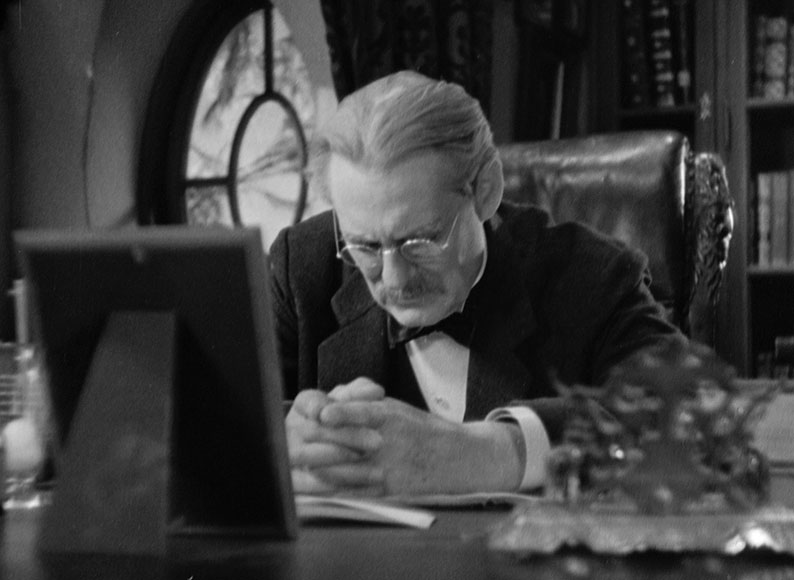
A clear indication of how badly this could backfire is provided when the action switches to a small town in Germany, where we’re introduced to Walter’s father, Dr. Holderlin (Lionel Barrymore) as he tends to Fritz (Marvin Stephens), the young son of one of the townspeople (Reinhold Pasch). Herr Holderlin tells Fritz not to get in any more fights, but when the boy reveals that he took on a bigger opponent after being called a Frenchman by him, Holderlin quickly changes his tune. He then checks himself and repeats his original advice, but with the proviso, “Hold yourself in. Save it for a real Frenchman.” After Fritz and Dr. Holderlin have jointly inferred that they hope Fritz will one day be in a position to give the French what for, Holderline is left alone with his painful memories, and gazes sadly at the picture of Walter he keeps on his desk.
His thoughts are interrupted by the arrival of Herr Walter Schultz, a self-important ninny wearing a suit and a moustache who has a habit of giggling annoyingly instead of getting to the point. He is here to ask Holderlin’s permission to date Elsa, to whom Holderlin has effectively become a father, his reasoning being that she is now available as her fiancé “died bravely on the field of battle.” None of this stirs any pleasant memories in Holderlin, whose expression as he listens to this claptrap suggests that he wants Schultz to shut up and bugger off. But Schultz continues, expressing his belief that due to his business interests and social standing, there is unlikely to be any objection “from the young lady.” He even tries to sell Holderlin on his proposal with the fact that he and the doctor’s late son share the same first name. Eventually, Holderlin just gets up and walks out of the room, into which Elsa then enters to assure Herr Schultz in no uncertain terms that she has no intention of marrying him. I liked her immediately. Indeed, I also quickly sympathised with Dr. Holderlin, whose grief at the loss of his son still hangs over him so heavily that he retreats from the selfish and insensitive ramblings of Herr Schultz to the boy’s perfectly preserved bedroom to sit alone in contemplative silence. We also then meet Holderlin’s equally grief-stricken wife (Louise Carter) as she sorrowfully lays flowers on her son’s grave, then comforts the mother of another fallen soldier as she tends to her own young son’s final resting place. The last thing I thus wanted was to see was further pain being inflicted on either party by potentially confrontational contact with each other. Maybe, I wondered after spending some time with the Holderlin family, Paul might by now have abandoned his quest and chosen instead to stay on home turf and come to terms with his guilt in a less destructive way. No such luck.
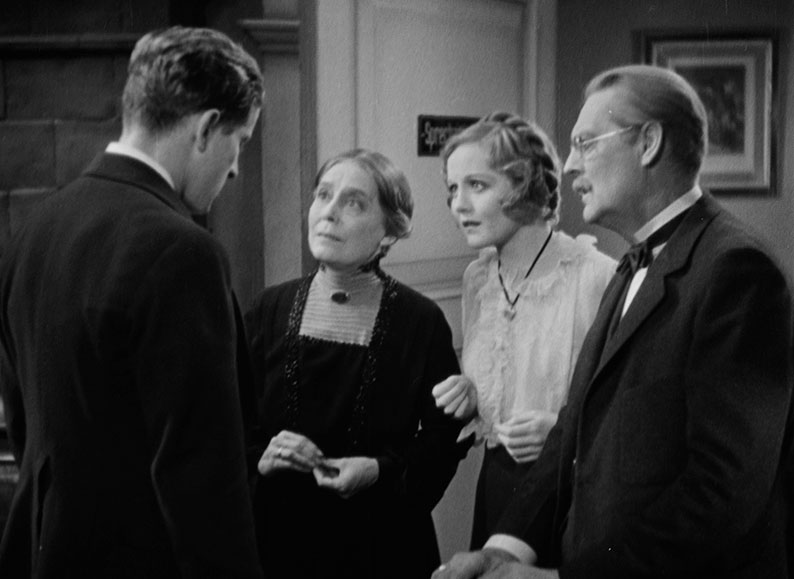
That very evening, as Frau Holderlin arrives home, confirmation comes that Paul is planning to see this through comes when we see him in the same street watching her enter her house. He even plucks up the courage to knock at the Holderlin’s door, but it’s answered by their maid, Anna (Zasu Pitts), who informs Paul that the family is dining, and Paul elects to put off the moment I had been secretly dreading and tells Anna he’ll come back another time. The next morning, when Elsa takes flowers to lay on Walter’s grave, she sees Paul standing by it paying quiet respects. When Paul realises that she has silently approached him, he awkwardly dons his hat and departs. It’s after this that the fateful moment finally arrives when Paul returns to pay Herr Holderlin a visit. Mistaking him for a new patient, Holderlin takes down his details, and reacts with disbelief and undisguised contempt when he discovers that Paul is a Frenchman, and angrily orders him out of his house. Paul refuses to leave and tries to explain himself, but the furious Holderlin is having none of it. “There can be no understanding between you and me,” he heatedly assures him. “Millions of dead lie between us. A dead world.” He then thrusts the framed picture of Walter into Paul’s face. “The French killed him,” he says bitterly, “To me, every Frenchman is the murderer of my son,” unaware that that the specific Frenchman in question is standing right before him. This prompts Paul to bury his face in his arm in despair and allows Holderlin a moment of quiet reflection. Unexpectedly, he then walks slowly around the seated Paul, lays his hand almost comfortingly on his shoulder and asks, “What can I do for you?” Here it comes, I thought, tensing up for what was inevitably to follow.
It’s then that Elsa bursts in to tell her surrogate father about the man she saw standing at Walter’s grave, and instantly recognises Paul. She reacts by running to fetch Frau Holderlin, convincing me that the revelation to follow was going to be even more painful than I expected. Once again, I was blindsided, as Frau Holderline then walks in, takes Paul’s hand and welcomes him into her home. In what felt like a dizzying blink of an eye, the family assumes that Paul knew Walter when he lived in France, and was such good friends with him that he felt the need to come to Germany and pay his respects. To Paul’s credit, he continues to wrestle with his guilt and attempt bring this growing misconception to a halt. But in the end the sheer joy that meeting someone who they believe knew their son in happier days brings to the Holderlins prompts him to eventually fold and go along with this unintended deception, telling them cheerfully false stories of his time with Paul in Paris as his spellbound audience hangs onto his every word. This little twist did nothing to ease my anxiety. If Holderlin already harboured a hatred for the man who killed his son, imagine how he might react if he should find out that this very individual has been masquerading as Walter’s friend, and as a result has been made a welcome guest in the Holderlin home. And he has to find out sooner or later, right? As a result, at no point in the drama that followed was I able to relax and feel unreservedly good for the characters. Yes, Paul’s presence made the Holderlins happy, and Elsa becomes so taken with him that a romance even starts to develop between the two, but…
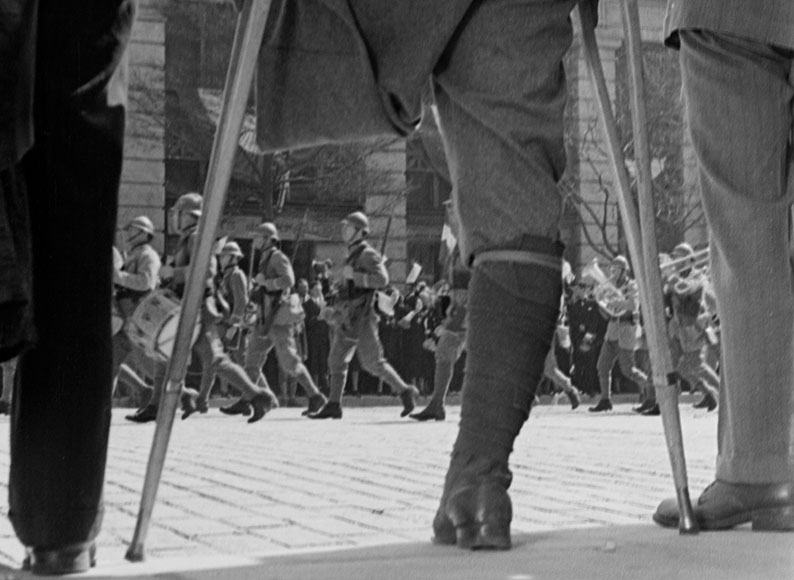
It's safe to say that director Ernst Lubitsch is primarily known for his elegant and sophisticated romantic comedies, a style that became so recognisable that it even led to his films being promoted as having ‘The Lubitsch Touch’. You won’t have to look far for acclaimed examples – try Ninotchka (1939), The Shop Around the Corner (1940), To Be or Not to Be (1942) and Heaven Can Wait (1943) to get you started. But Lubitsch had been directing for many years before the Lubitsch Touch became a thing, and nestled amongst his comedies and musicals are a sprinkling of less widely seen and discussed serious dramas, a prime example of which is Broken Lullaby. Written for the screen by Samson Raphaelson and Ernest Vajda, it was based on the less poetic title The Man I Killed (L'homme que j'ai tué), a 1925 stage play by Maurice Rostand, something I’d never have guessed from the strikingly cinematic montage with which the film begins. And it really is something. As celebratory bells ring, the image of soldiers marching through French streets to mark the first anniversary of the end of the war is observed from behind a watching veteran through the gap left by his amputated leg, establishing one of the film’s key concerns in a single, beautifully composed shot. As we are reminded of the explosive nature of warfare by images of artillery fire, shell-shocked and hospitalised veterans react with startled horror at the memory of this terrible sound, and as soldiers attend a church service, the camera lingers on the weapons they continue to wear, seemingly in defiance of the teachings of their chosen god. A short while later, the service concludes, and as the camera looks down in high angled wide shot on the now deserted pews, an indefinable shape can be seen perched on the back of one of them. Is it a bird, or an article discarded clothing? As the camera cranes down, it is eventually revealed to be the clutched praying hands of Paul, who is otherwise bowed so low in despair that he is initially rendered invisible. Start your film with a sequence this brilliantly composed, this thematically descriptive, and this superbly edited (it’s a crime that no editor is credited here) and you have my absolute attention from the off.
That we should feel discomforted by the situation and how it develops is clearly intended, and sets the groundwork for what evolves into one of the film’s central concerns. As Holderlin welcomes a man that he believes was good friends with his son into his home, his earlier hostility to the French as a nation begins to fade, and he eventually finds himself at odds with his former friends, whose prejudice remains undented. While the gossiping womenfolk seek information on this foreign visitor, their male counterparts all distrust him on principle, and all the while Paul is torn between the guilt of the secret he still harbours and the happiness that his unwilling deception is bringing to the family he believes he has so dreadfully wronged. Increasingly, the film becomes a pacifistic plea for tolerance, forgiveness, and universal brotherhood, a potent theme of a number of American post-WWI dramas, spearheaded by the success of Lewis Milestone’s Oscar-winning adaptation of German author Erich Maria Remarque’s All Quiet on the Western Front. On his commentary track, Joseph McBride suggests that the film is a little blunt in its messaging, but given the horrors that the world had experienced just a few years earlier and the passion of the both the message and the messengers here, such a direct approach seems wholly appropriate. And with so many of those in power having learned so little in subsequent years, it remains one worth repeating as loudly and clearly as possible until it starts to get through to even the most delusional cheerleader for armed conflict.
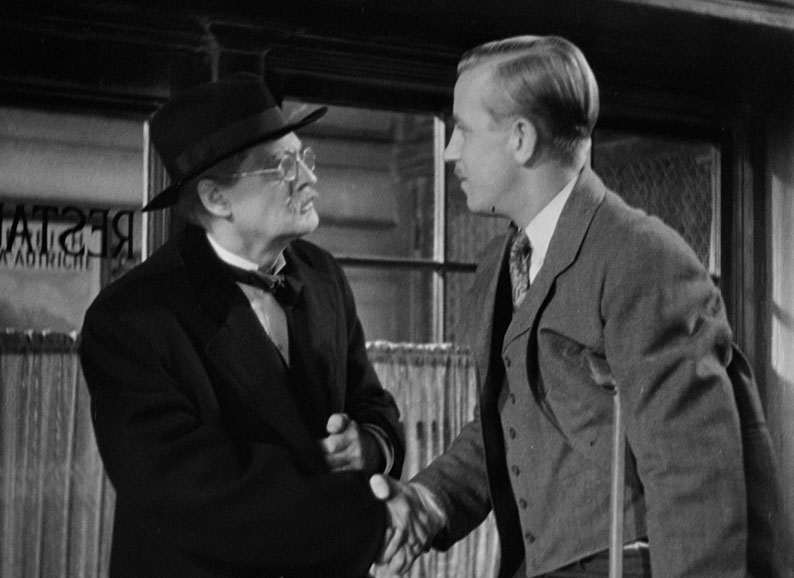
As Paul, Phillips Holmes – an actor whose film work I’ll admit to being largely unfamiliar with until now – does play at times to the silent cinema gallery. It’s the aspect of the film that dates it more precisely than any other, with Holmes expressing his emotions with all the restraint of Colin Clive’s wild proclamation that “It’s alive!” in James Whale’s Frankenstein of the previous year. That said, as an expressionistic symbol of tormented survivor guilt, he is still rather effective, and such acting does not feel out of place in a film of this vintage. By contrast, Lionel Barrymore’s portrayal of Holderlin’s grief and suppressed anger is more controlled, but in its way that allows it to be every bit as strongly conveyed. And his best moments really do pack a punch, notably the angry speech he delivers to a café table of still prejudiced men that he once regarded as his friends. As finishes his admonishment and dons his coat to leave, his words are sublimely underscored when a young disabled veteran gets up from his table and shakes him warmly by the hand, clearly delighted that the old man has publicly expressed views that he also silently harbours. I’ll also give a shout to Nancy Carroll as Elsa, who in the final act proves to be the moral centre of the story when she makes a decision that may at first seem questionable, but is sold as the only logical move forward by the conviction of the actor’s delivery.
Yes, aspects have dated, and if you go in expecting a film with the wit and sophistication of the works for which the director is best known, you may well experience a few pangs of disappointment. But in a lean 77 minutes, it tells a tightly constructed tale that successfully conveys the tortured angst of both parties, and unfolds in a manner that had me genuinely wound up for the consequences of a delayed revelation that was inevitably going to prove heartbreakingly painful for all involved. There’s even a subtle dig at the church and the questionable usefulness of confession and religious forgiveness, something that would doubtless have been stamped on had the film been made a few years later when the Production Code was being enforced. Exaggerated though some of the emotional beats may be, this is still a grippingly written and performed drama whose humanism, even all these years and wars later, remains tragically ignored in too many corners of the globe. It makes for arresting viewing, and while it may not have that elusive Lubitsch touch, as a piece of filmmaking – in its shot choices and compositions, its restrained use of emotive camera movements, and its exemplary editing – it’s still clearly the work of one of the true masters of cinema.
Framed in its original Academy ratio of 1.37:1, this is a solid, if not quite reference quality transfer, being stable in frame with inky black levels and decently balanced contrast, but with a sharpness that does vary a little and is sometimes a tad soft on fine detail. A few remaining dusts spots and the odd scratch are still visible, plus a single frame of more prominent damage as Holderlin exits the café, but it’s still very watchable and largely robust, and its best looks good for a film of this vintage.
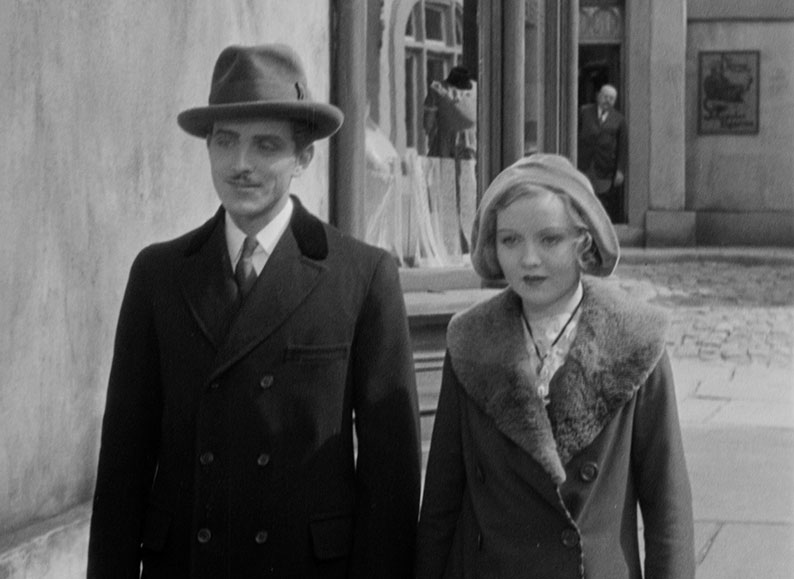
The Linear PCM 1.0 mono soundtrack also betrays the film’s age, in its unsurprisingly narrow tonal range and some audible background fluff. Dialogue is always clearly discernible, however, and that’s coming from someone whose tinnitus is loud enough to drown out his bedside alarm some mornings.
Optional English subtitles for the deaf and hearing impaired are included. The disc is region B encoded.
Audio Commentary with Joseph McBride
The author of How Did Lubitsch Do It? examines the film in some detail, and contextualises it in relation to the director’s career and his more widely known romantic comedies, of which McBride is unsurprisingly an enthusiast. He discusses the sympathetic portrayal of Germans in Hollywood movies in the post-war years, how this film explores the concept of survivor guilt and how this may have been a reflection of the director’s own experience of leaving Germany, and how political elements manifested themselves in Lubitsch’s cinema. Despite his high praise for the opening montage, he quickly confirms that he does not hold all of Broken Lullaby in similarly high regard, expressing bemusement at the unbridled enthusiasm of its initial critical reception (they are a bit much), and being critical of its blunt approach to elements that he praises for being more subtly handled elsewhere in Lubitsch’s oeuvre. He also compares it unfavourably to François Ozon’s 2016 remake, Frantz, and suggests that critics tend to overrate films that have ‘noble’ themes. He does, however, praise individual sequences for their writing, performance and handling, and describes the final five minutes as one of the most beautiful endings he’s ever seen.
The Films of Ernest Lubitsch (69:24)
An audio recording – which runs under the film in the manner of a second commentary track – of a lecture on Lubitsch given by author of the Lubitsch biography, Ernst Lubitsch: Laughter in Paradise, Scott Eyman, conducted at the National Film Theatre in London on 6 December 2001 as part of a Lubitsch retrospective. Essentially a trip through Lubitsch’s early life and subsequent highlights of his film career, it’s engagingly delivered and peppered with astute opinion and interesting anecdotes, and even includes a brief Q&A with the audience at the end. In case you were wondering, Broken Lullaby doesn’t get a mention.
The Men I Killed (13:15)
A fascinating featurette, written and edited by Michael Brooke, that uses text, newspaper clippings, image scans, posters, and film clips to trace the origins of the play on which Broken Lullaby is based, and make direct comparisons Lubitsch’s film and François Ozon’s 2016 remake, Frantz. It thoughtfully announces up front that there are spoilers for both films and for Maurice Rostand’s original play, but still tactfully avoids revealing plot details when Ozon’s film diverges substantially from Lubitsch’s.
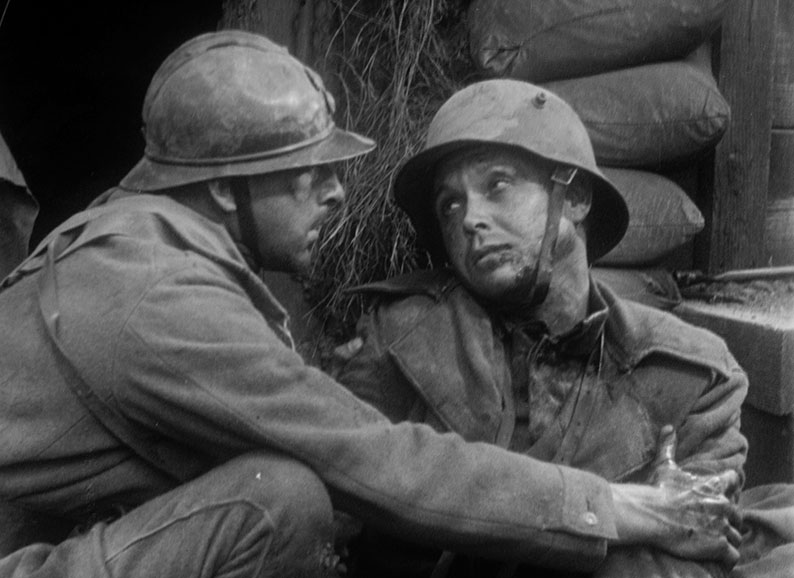
Image Gallery
45 screens of superb quality promotional stills (including portraits, posed and composited imagery), brightly coloured lobby cards, and intriguing international posters
The 36-page accompanying Booklet kicks off with an excellent essay on the film by lead film critic of the i newspaper, Christina Newland, who notes from the off that it wastes “not a moment of its slim running time.” Absolutely. Next is a 1932 profile of Lubitsch by Fred Pasley for the New York Daily News, written shortly after the production of Broken Lullaby when it was still being screened under its original stage-play title of The Man I Killed. Also from 1932 is a profile of lead actor Lionel Barrymore by Alice Alden for her Great Moments in the Lives of Great People column from the Albuquerque Journal. Two brief contemporary pieces – one by the (in)famous Louella Parsons – on co-screenwriter Samson Raphaelson are followed by examples of the rave reviews the film attracted on its release.
Some will find this film’s messaging a little on-the-nose (indeed, that’s one of the very descriptions of it employed by Joseph McBride in his commentary), but for me Broken Lullaby proved a compelling and sometimes emotionally gut-wrenching experience. It’s an involving, moving and impeccably directed humanitarian work, and while the transfer here may not quite hit the heights of the best restorations of films of this period, it’s still a solid job and backed up by some very fine special features. Warmly recommended.
|